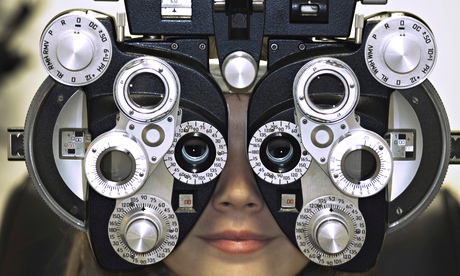
Just over half of people between the ages of 40 and 75 have not had a recent eye test, according to a survey of 1,000 people by the health insurance company Simplyhealth. But do they need one? And is it necessary to spend between £20 and £30 to get tested by an optometrist or is it OK just to pick up some cheap specs at the chemist?
The solution
The College of Optometrists recommends that everyone over the age of 16 should have an eye test every two years, and more frequently if they have an eye problem. Children should have annual tests. The college stipulates exactly how examinations should be done, which includes looking at the outside and the back of the eye (using an ophthalmoscope) and testing for sight defects (such as loss of visual acuity, whereby you can't read those letters on the chart).
Karen Sparrow, head of professional development at the Association of Optometrists, says it is best to get your eyes properly assessed before going for the cheap over-the-counter option for your glasses.
Eye tests can pick up medical problems such as diabetes and high blood pressure before they become symptomatic because these conditions lead to changes in the blood vessels at the back of your eye. Other problems, such as age-related macular degeneration, where the central part of the back of the eye stops working and you lose vision directly in front of you, cataracts, which cloud your vision, and glaucoma, in which fluid builds up inside the eye, can all be detected by routine eye tests. Some of these conditions are more treatable than others.
Sparrow says that age most noticeably impacts on our eyes between the ages of 40 and 60. This is when many of us find it harder to read and begin to suffer from eyestrain. Age reduces our ability to focus and, without help, our eyes feel tired and gritty and we get tension headaches. GPs will often suggest a referral to the optometrist when patients complain of having regular headaches.
Even if we wear glasses, it is important to take care of our eyes if we use computer screens for extended periods of time. The image on a screen makes us adjust our focus more often and tires our eyes – which also feel dry because we forget to blink when we read on a screen. Sparrow advises five minutes away from the computer every hour.
Most of us don't have eye tests every two years, but there is some evidence that it is beneficial to do so. A guideline based on an evidence review by Canadian optometrists recommended two-yearly tests, increasing to yearly over the age of 65. Some people are eligible for free tests, but even if you have to pay, it is likely to be worth it to prevent gritty eyes and headaches.

